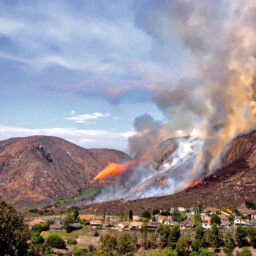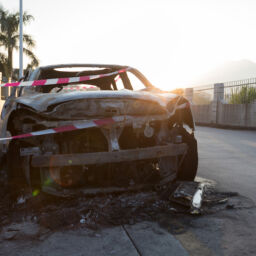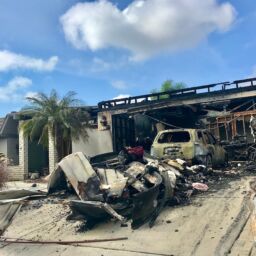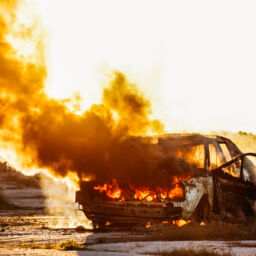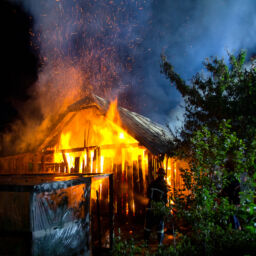CNN — On August 8, the day that Maui was overcome with flames, Qiana Di Bari saw a puff of smoke near her home and knew she and her family had to escape.
Earlier that day, a fire had been spotted and put out in her vibrant Lahaina neighborhood. But by late afternoon, Di Bari was hearing of more fires elsewhere on the island. The island’s resources, she knew, were stretched thin.
“When I saw that fire reignite … we knew we were on our own,” she said.
She, her husband and their daughter grabbed some essentials — cell phones, important documents, school books, a few outfits each — and fled. “My gut just told me to run,” she said. “Within minutes, our neighborhood was gone.”
Miraculously, Di Bari’s home survived. But Sale Pepe Pizzeria e Cucina, the Italian restaurant she owns with her husband, did not.
[…]
The fire that ripped through Maui two weeks ago was the deadliest in the United States in over a century. At least 115 people have died and around 850 are not yet accounted for, according to official estimates.
Those who survived suffered devastating losses — of loved ones, pets and homes. Some, like the Di Baris, saw their businesses reduced to rubble.
In Lahaina, a historic area and popular tourist destination that was hit particularly hard by the fires, restaurants are big business. As of May 2022, nearly 17% of people employed in the Kahului metropolitan area, which includes Lahaina, worked in food preparation and service — more than in any other sector. Nationally, about 8.5% of workers are employed in food prep and service, according to data from the Bureau of Labor Statistics.
Restaurants are an important part of the tourism sector, which is responsible for 75% of all private-sector jobs in Maui. Accommodation and food services, including arts and entertainment, account for the largest share of those jobs.
Now, that industry is in trouble.
[…]
Piles of ash
Restaurant owner Javier Barberi was at his home on the north side of the island, away from the blaze, on the day the fires broke out. Through a firefighter friend, Barberi heard calls come through the radio. “We could hear all these locations — the Wharf Cinema Center’s on fire, the line of Front Street apartments are on fire, we can’t contain this area … and it just got progressively worse and worse and worse and worse.”
At some point, cell service went down in the impacted areas, and Barberi couldn’t get in touch with friends or workers. He felt helpless.
Eventually, he was able to make his way to the site of Down the Hatch, one of the restaurants he co-owns as part of the Hana Hou Hospitality group. So many buildings had burned down that he had difficulty orienting himself, he said. The area’s 150-year-old Banyan tree, which had been across the street from Down the Hatch, became a guidepost.
“I knew from looking at the tree exactly where my restaurant should be. But it’s not there,” he said. Instead, there was “a gigantic pile of ash.”
Unsafe water and conditions
Restaurant owners whose buildings remain standing are also struggling. Their restaurants survived, but their future is uncertain.
In Kula, about an hour’s drive from Lahaina, fires damaged the Kula Sandalwoods Inn & Cafe, which has been in Monica Loui’s family for decades.
Loui, along with her brother, sister, brother-in-law and others, fought off the blaze for as long as they could, spraying water from garden hoses to put out patches of fire. Eventually, firefighters told them to evacuate.
[…]
As Loui processes the losses, she’s determined to rebuild. “This is our family legacy,” she said. “There’s no choice but to move forward.”
In Lahaina, some operators are barely able to access their restaurants. Caleb Hopkins, who is also part of the Hana Hou Hospitality group but does not co-own Down the Hatch, is one of the owners of Māla Ocean Tavern and Duckine — two restaurants in Lahaina that survived but are not operable. As of early this week, the restaurants still didn’t have power and remained off limits. “We’re not even allowed to go there,” he said.
Hopkins’ own house survived the flames, but he and his family are unable to stay there. Ultimately, Hopkins believes it will have to be torn down because of the damage sustained.
While staying with friends, he’s been trying to figure out how to help employees, along with Barberi and other members of the restaurant collective. “We’re trying to find long-term solutions for housing for these families that don’t have anything left.”
Many operators and their supporters, including Di Bari, Loui’s family, and Hana Hou Hospitality have sent up fund-raising campaigns through GoFundMe to raise money for their businesses and staff.
[…]
Full story: CNN August 24, 2023





